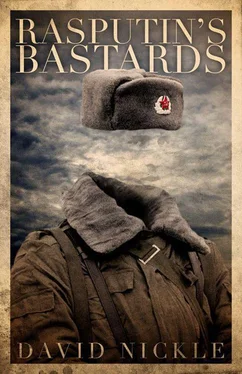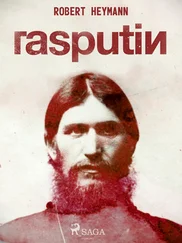“And where,” said Alexei, “is here? Don’t say New Pokrovskoye.”
The Koldun laughed. “We’re in Labrador, which is a part of Canada no one much goes to. We established it to keep a close eye on the NATO base at Goose Bay. We keep it now — well, let me just say that it suits our purposes, past and present.”
Alexei stomped his bare feet on the rock. He took another breath. This time, the smells were gone.
“We are in New Pokrovskoye, and Labrador. And you call yourself a Koldun.”
Borovich smiled and nodded.
“That’s an old name,” said Alexei. “It means that you are a village wizard.” He waggled his fingers. “Casting charms on people and such.”
The Koldun shrugged. He gestured to the log building behind them. “There is my sauna,” he said. A village Koldun, Alexei knew, spent a lot of time in saunas. “A good place to meditate. I do not cast many charms, though.”
“Except metaphorically,” said Alexei. “Tell me — did you preside over the awakening of all the newcomers to—” he snapped his fingers.
“New Pokrovskoye.”
“Right.”
“No.”
“Another question, and I won’t trouble you. You talked about a ‘dreaming army.’”
“I did,” said the Koldun.
“Am I dreaming now?” said Alexei.
The Koldun laughed. “Truly,” he said, “that is a question I cannot reliably answer. Come over here—” he gestured around the side of the structure. “We should put some clothes on you. Your balls are as small as pebbles in the cold.”
A few minutes later, Alexei was dressed in a pair of cotton trousers and a thick woollen sweater — clothing he’d never seen before but which nevertheless fit him perfectly — and walking down the hill with the Koldun.
He regarded the smaller man. The Koldun was old. Maybe he was old as Kolyokov was these days. But he was in much better shape. His hair was all there, and still mostly black, combed back into a thick ponytail. His beard had borne the years more vividly — it was streaked with grey and white where it drooped below his chin. Alexei felt as though he ought to like this Koldun character, and in many ways he did. A Koldun, at least as far as Alexei remembered from his mother’s stories, was a wizard true enough — but force of good in a community. And this one seemed to be that. He had, after all, pulled Alexei from the pits of dream; helped him back into himself; answered his questions as best he could; and given Alexei clothes and a bath.
But Alexei could have said the same things about Holden Gibson — and he didn’t like or trust that old bastard at all.
And on the subject of Gibson…
“I came here with some people,” said Alexei. “In a big boat. A yacht. I don’t see them here.”
The Koldun put up his hand to hush him.
“In time,” he said, “you’ll see them all.”
Alexei frowned. Something was in the Koldun’s tone he didn’t like.
“What about the children?”
The Koldun looked at Alexei sidelong, and smiled.
“In time, Kilodovich,” he said. “In time.”
They had been walking down a broad, rocky pathway between planted rows of small conifer trees. The path was ending now, intersecting another at a wooden platform from which a long, precarious stair descended down a cliffside. For the first time, Alexei got a proper view of the village.
He made an appreciative noise.
The village spread below them to the left and right, hugging the crescent of a wide and stony harbour like lichen. It seemed to Alexei that it was snatched not out of time, but memory. The houses were all of dark log, neatly cut with bright window trims and great red and green beams along the spines of their wood-shingled roofs. Did a village such as this ever truly exist a century ago? Probably not. But its sight filled Alexei with an almost painful nostalgia — far from his just-relived memories of City 512, this was the place he wished to have come from.
Past the water’s edge, it seemed as though another village began — this one stretching up long docks and out to the harbour’s middle. It was a village of boats — and a strange, incongruous collection of boats. There were fishing boats, with netting gathered at their sterns like dark peacock plumage; narrow wooden sailboats, painted outrageously in brilliant primary colours; long canoes with outboard motors dangling off their backs; a little cabin cruiser, painted like the sailboats; and at the end of the longest pier, a plainer motor yacht that dwarfed the rest. Alexei recognized it immediately as Holden Gibson’s.
“This is a forward base?” Alexei frowned. “Pretty conspicuous, I’d think, for that kind of work.”
The Koldun laughed. “Not at all. No one knows about it who doesn’t live here.”
“Of course not.”
It occurred to Alexei then that the Koldun’s words might have meant something else — that the place didn’t exist but for those who lived here — that it was nothing more than a dream. Nothing is real . Alexei was beginning to think this was a more and more reasonable proposition.
The Koldun leaned on the railing of the strange staircase. He spared Alexei a brief but penetrating glance.
“Tonight,” he said, “there will be a dance in the town. You should come to that; we’ll maybe talk some more. But I don’t think a lot of talking is what you need now. You don’t remember anything. So what you need is a lot of thinking — yes?”
“If you say so,” said Alexei.
“Don’t come down to the town straight away,” said the Koldun. “No point in seeing too much at once. Go to the lighthouse for now. When more people come, they’ll be billeted there. But for now, no one but you.”
“You have a lighthouse here? Is there shipping?”
The Koldun laughed. “No shipping. Just what you see here. The lighthouse was here when I came. There’s a story behind that. But for later.”
Alexei was puzzled — he had half a mind to protest, to go down the stairs to the town. But he had to admit, the idea of food and rest was tempting.
“All right,” said Alexei. “Which way?”
The Koldun waved a hand to his right. “That path,” he said, “takes you straight there. I’ve got some business to attend to in town — more new arrivals to greet, I’m afraid. So if it’s all right, you just go off on your own — take it easy for a couple of hours? Yes?”
“Sure,” said Alexei. He waited until the Koldun had disappeared over the edge of the staircase — listened as the older man’s footfalls diminished down the rock side — before he set off down his own path.
The path led Alexei along a high ridge of sea-weathered rock, over the town and toward the lighthouse. The path was lined with brilliant yellow wildflowers here, their shoots encroaching on Alexei’s stride. The nearer he came to the lighthouse, the narrower the ridge became. Alexei could barely maintain his footing. How the hell did they get the trucks and machinery out here they’d need to build the thing?
It was the least of the mysteries that this strange hamlet presented. Quite aside from the peculiar tug on memory that the place presented to him — the discomforting aura of comfort — it was difficult to imagine how the people here had managed to keep it hidden; particularly given the Koldun’s explanation that this village was nothing less than a forward base for old Soviet espionage activities.
No, Alexei decided. This Koldun character was lying — or at the very least, not telling the whole of the truth.
Alexei stepped up to the door of the lighthouse, and paused to examine the stonework. This building was no Cold War relic — even to Alexei’s untrained eye, it was clear it was no younger than a century. It looked like it was made out of hand-cut limestone, in the fashion of a fortification. What had been in this isolated harbour before the Koldun and his crew had come here?
Читать дальше












